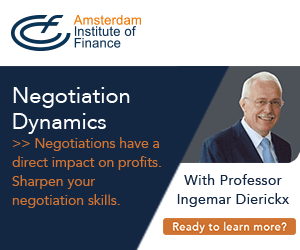
“It’s catastrophic when people want to keep negotiations simple”, says Ingemar Dierickx while he’s enjoying a glass of red wine in the Amsterdam DoubleTree Hilton. He’s just finished teaching the first day of a three-day course on ‘Negotiation Dynamics’. At the end of the day, he asked the attendees the following question: “what is the most difficult part of starting a negotiation? That’s your homework for tonight.”
“The hardest part is finding room to maneuver,” says Dierickx when the attendees have gone home and the sun is about to go down. “When there’s only one item on the agenda, people stake out positions, they start arguing and dig in. The end result is either the ubiquitous ‘50/50 compromise’ – a simplistic ‘solution’ which fails to address all relevant aspects of the problem – or worse, a stand-off. So, create some room to maneuver. That’s why it’s a catastrophe when people say ‘let’s keep it simple’.”
It’s been a day full of anecdotes, jokes, parables, and insights. Dierickx, born in 1952 in the Belgian city of Ghent, speaks with a slight New Zealand accent when he’s showcasing his extensive experience. For three decades he’s been negotiating, studying negotiations and teaching people how to negotiate. He’s seen many nationalities at work and witnessed the different styles they employ.
The essence of negotiation is to trade
“Stereotypes can be dangerous, of course, but I think there’s some truth to them.” Dierickx uses stereotypes tongue-in-cheek to illustrate flawed negotiation strategies. The first stereotypical approach he criticizes is the ‘German method’, where negotiators discuss the items on the agenda one-by-one. He describes it as “factual and logical, but devoid of any creativity.” When each item on the agenda is negotiated separately, it’s impossible to ‘give’ on one issue and ‘take’ on another. The essence of negotiation is to trade, or as Dierickx puts it, “you scratch my back and I’ll scratch yours”.
This is why the Flemish Dierickx prefers the ‘Italian method’. It’s chaotic and creative. Everything is on the table and everything is negotiable. It abhors dogmas.
The Italian method was illustrated in one of the day’s exercises. After lunch, during which the participants had time to reflect on the blunders they’d made that morning, they were divided into groups for a multi-issue negotiation. With Dierickx’s remarks in mind, all groups worked through their agendas and tried to get an image of the opponent’s ambitions and constraints. Most of the groups walked away with a deal that they felt happy about.
“The objective is to make the other side walk away with smiles on their faces”, summarizes Dierickx. “What is it about, after all? Denying value or creating value?” This is why he rejects the ‘French method’. “C’est impossible, parce que…”: it’s impossible, because…
There is nothing naive about give and take
He remembers a negotiation between a large retailer and a small family-owned company that was growing very fast. The family company had a serious liquidity problem, which is often the case with such companies, so it asked for shorter terms of payment. The retailer was not receptive, however. The retailer knew it was the dominant party in the negotiation and was able to dictate terms and conditions. “Shorter payment terms? Impossible. Payment terms are not negotiable – company policy. If you have a liquidity problem, that’s your problem.” “That’s the French method”, Dierickx observes, “and it’s not smart.”
“Negotiations require selective pressure”, says Dierickx. “But the retailer applied pressure everywhere. They could have exchanged shorter terms of payment for something else, such as higher quantity discounts.” Then the deal would have been better for both sides. “There is nothing naive about give and take.”
“Always be constructive and helpful in negotiations”, Dierickx said to the group. Develop a genuine interest in the other side. “A negotiation can be a voyage of discovery. An opportunity to get to know the other person.”
Dierickx recalls an incident when he was an observer in a negotiation between a CFO and a potential client. In the early chit-chat, the client passingly mentioned a marathon taking place in the city that day. A telling hint that the client was a marathon runner. Dierickx hoped the CFO would pick up on it and show interest. He didn’t.
“That’s almost impossible to remedy”, sighs Dierickx. “The CFO showed he was interested in the client’s business, but not in the client.”
“Smart negotiators will make sure the conversation revolves around the other party.” Not only will it improve the atmosphere, but it will provide additional information. And information is critical to negotiations, as the day’s first exercise demonstrated: clever negotiators who had been able to sniff out a lot of information from their counterpart got outstanding deals. Those who learned little or nothing got taken to the cleaners.
“Always observe the ‘Chinese rule’”, says Dierickx. “As long as you haven’t got a detailed picture of the other party – their dreams, ambitions, goals, budget, their alternatives and constraints – do not commit yourself to specifics. One of the most common mistakes made by western negotiators is to put a specific proposal on the table far too early in the negotiation process – when they haven’t got enough information about their counterpart. And of course, the Chinese rule also implies that as long as you haven’t got such a detailed picture of the other side, do not agree to any of their proposals either!”
Genuine interest
In conclusion: a genuine interest in the other side. But if the goal is to get a better deal, asked one of the attendees, can that interest be called genuine? “I think so. In my experience, the best negotiators usually have a combination of a genuine interest in the other party and a genuine interest in the result.”
It shows in Dierickx’ conversational style. When interviewing a professional negotiator, one might expect harsh answers and cutting rebuttals. But Dierickx shows a sincere interest and answers questions at length.
The topic of genuine interest brings him, after the course has finished and Dierickx is able to relax with his glass of wine, to his time in Russia where he worked at the Moscow School of Management. “In many ways, Russian negotiators remind me of Israeli negotiators. They crave a bit of personal appreciation. The outside world, however, often does not give it to them. They put on a tough and expressionless attitude, but while they initially may appear cold, they are in fact intensely emotional.”
“A ‘sabra’ is a cactus fruit with a thick skin that conceals a sweet, softer interior. This term could be equally applicable to Russians as to Israelis born in Israel. Both also combine intense emotionality with a sharp, analytical mind. In negotiation, they are very direct and very demanding. But they are also very loyal, and can be very grateful. Perhaps a third of my negotiations are with Russians and Israelis, but three out of every four thank-you notes I receive are from them. And they clearly put thought into it. That doesn’t happen with Americans or the Dutch.”
“Christmas is a very important holiday at our house. All our children have their own Christmas tree. Music also: my wife is a soprano. So, what is sent to our house one day by a Russian negotiator? Small, handcrafted musical instruments to place in the Christmas tree.”
How do the Dutch perform in negotiations, in Dierickx’s eyes? “They have a reputation as solid. Very open and direct. The Dutch say what they want and they approach negotiations without reservations. The Flemish,” – a quick look of concern comes to his face – “they are difficult. More reserved. They’ll appear friendly, but will usually interpret Dutch directness as a sign of aggression.”
All day, Dierickx has been consistently positive about one nationality. “New Zealanders will always be constructive.” Dierickx has been living there since he left Moscow. It’s clear what he feels is the right negotiation method. “Whatever it is, New Zealanders will try to find a solution. ‘Don’t worry mate, we’ll sort this out.’ That’s how to make money.”
Join ambitious professionals for the challenging ‘Negotiation Dynamics’ program, taught by Professor Ingemar Dierickx at Amsterdam Institute of Finance. Read more >>
